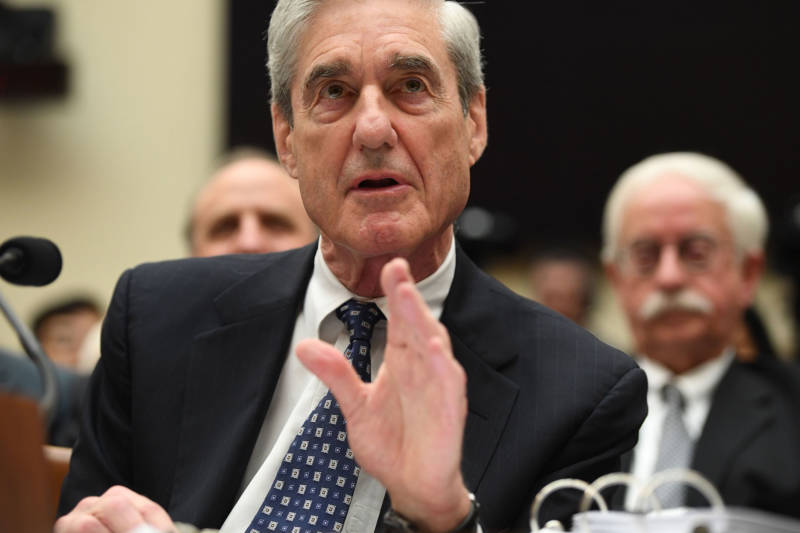Updated at 4:26 p.m. ET
Get Caught Up: Republicans and Democrats took their questions for former special counsel Robert Mueller in sharply different directions on Wednesday. Mueller appeared before both the House judiciary and intelligence committees.
- Mueller reinforced that he had not "exculpated" President Trump and said he believed Trump could be charged with obstruction of justice when out of office.
- Mueller said he thought that future political campaigns should report contacts with foreign agents and that they could be, "depending on the circumstances, a crime."
- As to Trump's praise of WikiLeaks in 2016 as it was revealing material stolen by Russian cyberattackers: "Problematic would be an understatement," Mueller said.
- Read Mueller's opening statement.
Watch Mueller's testimony and analysis from PBS NewsHour.
Peril from foreign interference in American elections will persist through the 2020 presidential race, former special counsel Robert Mueller warned on Wednesday.
Asked whether Russia would attempt to attack future U.S. elections, as it did in 2016, Mueller replied: "They're doing it as we sit here."
Mueller didn't detail a prescription for how he believes Congress or the United States should respond, but he recommended generally that intelligence and law enforcement agencies should work together.
"They should use the full resources that we have to address this," Mueller said.
That warning followed hours of hearings before two committees in which Democrats sought to underscore that Mueller had not cleared Trump of obstruction allegations and that he had found many contacts between Trump's campaign and the Russian interference in the 2016 election.
"Did you actually totally exonerate the president?" asked House Judiciary Committee Chairman Jerry Nadler, D-N.Y.
"No," Mueller said.
The exchange made the point that Democrats have repeated since Mueller filed his report: His findings don't boil down to a vindication or an inoculation for Trump, as the president claims.
What isn't clear is what they will mean in terms of actions by the president's opponents.
Mueller studiously avoided being drawn into questions about prospective impeachment proceedings — which divide the Democrats that control the House majority — although he admitted that a prosecutor still might charge Trump with a crime after he's no longer in office.
Rep. Ken Buck, R-Colo., asked Mueller whether he believed there was sufficient evidence for a charge when Trump no longer enjoys the protection of the Justice Department policy that forbids indicting a president.
Yes, Mueller said. But for the Office of Legal Counsel's opinion that bars charging a president, the former special counsel said to Rep. Ted Lieu, D-Calif., that he and his office might have decided whether to try to bring an indictment against Trump.
Some Democratic presidential candidates have endorsed doing so if they're elected next year, but no president has ever been prosecuted after the fact for actions in office — another political minefield for the party to navigate.
Other Democrats on Wednesday emphasized what they called key findings from the special counsel's investigation, including the details about Trump's then-campaign chairman, Paul Manafort, meeting with a Russian contact who has been linked with Russia's intelligence agencies — and giving him polling and other material from the Trump campaign.
But Mueller also stressed that he would not go beyond what he has already said or written or violate the guidelines the Justice Department has imposed on what he can reveal on Wednesday.
Time and time again, he declined to associate himself with whatever characterization was being drawn by a lawmaker questioning him and on a few occasions he responded curtly: "I take your question."

9(MDAxOTAwOTE4MDEyMTkxMDAzNjczZDljZA004))
